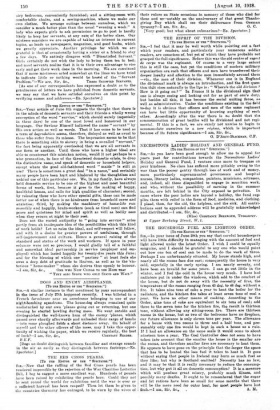[To THE EDITOR OF THE SPECTATOR.") Sta,—Your article of June
8th suggests the thought that there is in the minds of domestic servants and their friends a wholly wrong conception of the word "service," which should surely (especially in these days) be one of the most loved and honoured in our language. Our Saviour Himself hallowed the name " servant " by His own action as well as words. That it has come to be used as a term of degradation seems, therefore, disloyal as well as cruel to those who suffer from its misuse. The impression seems to be that there is something akin to slavery in being a so-called "servant," the fact being apparently overlooked that we are all servants in one form or another. Until those who have a higher ideal are able to counteract this mistaken notion, would it not perhaps be a wise precaution, in face of the threatened domestic oriole, to drop the distinctive name, and speak of domestic or household helpers, except where the good old-fashioned word "melds" is still in use)* There is sometimes a great deal "in a name," and certainly many people have been hurt and hindered by the thoughtless and unkind use of this particular one. We, tn my family, have always held domestic service to be one of the highest and most beautiful forma of work, first, because it goes to the making of happy, healthful homes, and mils for high qualities of character; second. by releasing those who have other special gifts, these can be made better use of when there is no hindrance from household cares and anxieties; third, by making the machinery of home-life run smoothly and happily, brain-workers (such as tired men) can find pence and quietness for mind and spirit as well as bodily ease when they return at night to their rest.
Does not the rooted antipathy to "going into service" arise partly from ah inadequate idea of the possibilities which this kind of work holds? Let us rake the ideal, and self-respect will follow, and with it a desire for greater powers of usefulness, through self-improvement and culture. Hence a general raising of the standard and status of the work and workers. If space in your columns were not so precious, I would gladly tell of a faithful and somewhat ideal partnership in serviee (employer and em- ployed) which has lasted happily for twenty-five years this June; and for the blessing of which one " partner " at least feels she owes a deep debt of gratitude to Heaven, as well as to the 'vic- torious " home-maker " whom she desires thus openly to honour.
—I am, Sir, &R., ONE WHO Now CLINGS TO THE HOPE TliAT
" THEY ALSO SERVE WHO ONLY STAND AND WAIT."


































 Previous page
Previous page